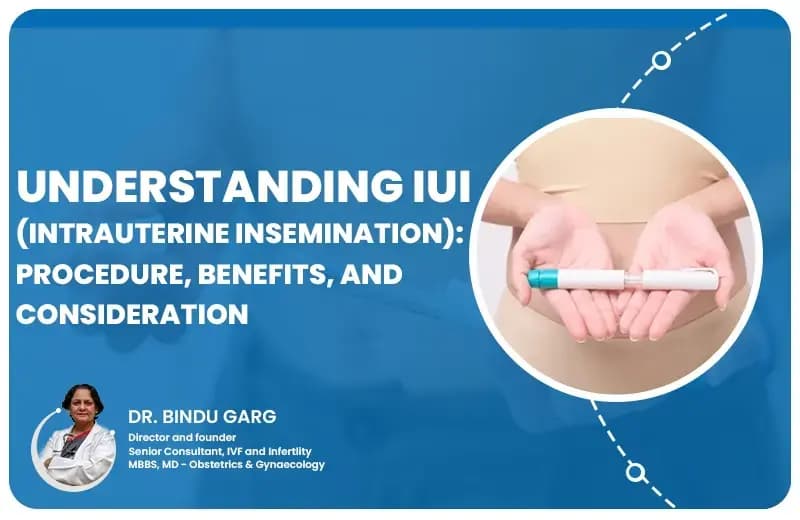
Understand IUI: Procedure, Benefits, and Consideration
In this article, we'll look at what IUI involves, its benefits, and some important things to know for those considering this option.
First, we must understand IUI, which is usually required for infertility in men or unmarried women who want to get pregnant. In this process, the semen sample collected is washed and processed in the lab at the time of ovulation of the woman, and the fertility doctor inserts these sperm into the uterus of the woman through a thin plastic catheter tube known as the IUI cannula! This scientific process is almost like natural reproduction.
In some cases, depending on the condition, women are also given medicines to increase ovulation and thus increase the chances of pregnancy. The most important requirement for IUI is that the woman's fallopian tubes should be open so that the egg can travel from the ovary to the tube and the fertilizing sperm can reach there and fertilize the egg and form an embryo/baby.
What is the difference between natural IUI and IUI with fertility medicine?
Natural IUI - Whether or not you will be given any fertility drugs along with the IUI procedure will depend on the cause of your infertility, age, and other relevant factors.
IUI in which no medication is given to increase the size of the egg is a natural cycle IUI. For this, one has to visit the infertility centre where regular ultrasound monitoring is done to check the increasing size of an egg and detect natural ovulation once it is ready. Once ovulation occurs, the doctor performs the IUI procedure within 24 hours of follicular rupture which can be around the 12th to 16th day of the natural menstrual cycle depending on the patient.
IUI with fertility medicine - If you have any fertility problems associated with decreased ovulation, borderline ovarian reserve or low AMH, IUI in old age, etc., then fertility drugs are used to increase the chances of pregnancy. This is called IUI with ovulation induction.
Ovulation Induction
In this, the patient is given fertility drugs from the first ⅔ day of the menstrual cycle. This produces more eggs and increases the chances of pregnancy. After this, the development of the eggs is monitored through ultrasound and if needed, hormone injections are also given to support the development of the eggs. Once the eggs are matured, an injection is given to rupture them and then IUI is done between 24 to 40 hours after the injection.
How is IUI done?
IUI procedure: If you are using your husband's sperm, your husband will be asked to come with you to the infertility centre on the day of the IUI. At the clinic, your partner will be asked to provide a semen sample. The semen will then be washed and cleaned in the laboratory and processed to prepare for IUI. If you are using a sperm donor, his sperm is already present in the laboratory in the form of frozen samples that can be warmed and processed for the donor IUI procedure.
Once the processed semen sample is ready, the doctor at the infertility center will ask you to lie down on the table and after making you sit in a comfortable position, a thin plastic catheter tube known as an IUI cannula will be passed from your vulva to the cervix and gently inserted through the cervix for a very short distance. You may feel slight pain during this time. Now with the help of this tube, the clean sperm will be inserted into your uterus.
After the Procedure
After this, the doctor at the top IVF centre will ask you to lie down for some time with a pillow under your buttocks or with your legs on a table. After this rest, you are fine and can go home with pregnancy-supporting medicines, which have to be taken for the next 15-16 days and wait for the missed period.
You don't have to worry that the sperm will come out while you walk or work, as they will be kept in your uterus. So you can go to an office or work from the next day.
Symptoms of Pregnancy after IUI
About two weeks after the IUI procedure, patients may notice the following symptoms:
- Missed periods: A patient missing her period after 15-16 days of IUI indicates that she may be pregnant or it could be the effect of progesterone supplements given after IUI to support pregnancy. If you miss your period, you should immediately contact your doctor and get a urine or blood test done to confirm pregnancy.
- Bleeding: When the embryo implants itself on the uterine wall, bleeding may start. This bleeding may be like spotting. It usually occurs about two weeks after the IUI procedure. Keep in mind that bleeding does not occur in every case. This is completely normal and may be the first sign of pregnancy but it requires medical attention. You may also experience some abdominal discomfort during this time.
- Breast tenderness: You may feel sensitivity, tenderness, and mild pain in the breasts.
Conclusion
Intrauterine insemination (IUI) offers couples a practical and effective way to increase their chances of getting pregnant. By learning about the procedure, its benefits, and key considerations, people can make informed choices about their fertility journey.
Whether you're struggling with male infertility or want to become a parent as a single woman, IUI can be a helpful option. If you're thinking about fertility treatments, talking to a qualified fertility specialist about IUI can give you the information and guidance you need to move forward.
Content Created By:

CyberBizz Technologies
Team - Content Curator